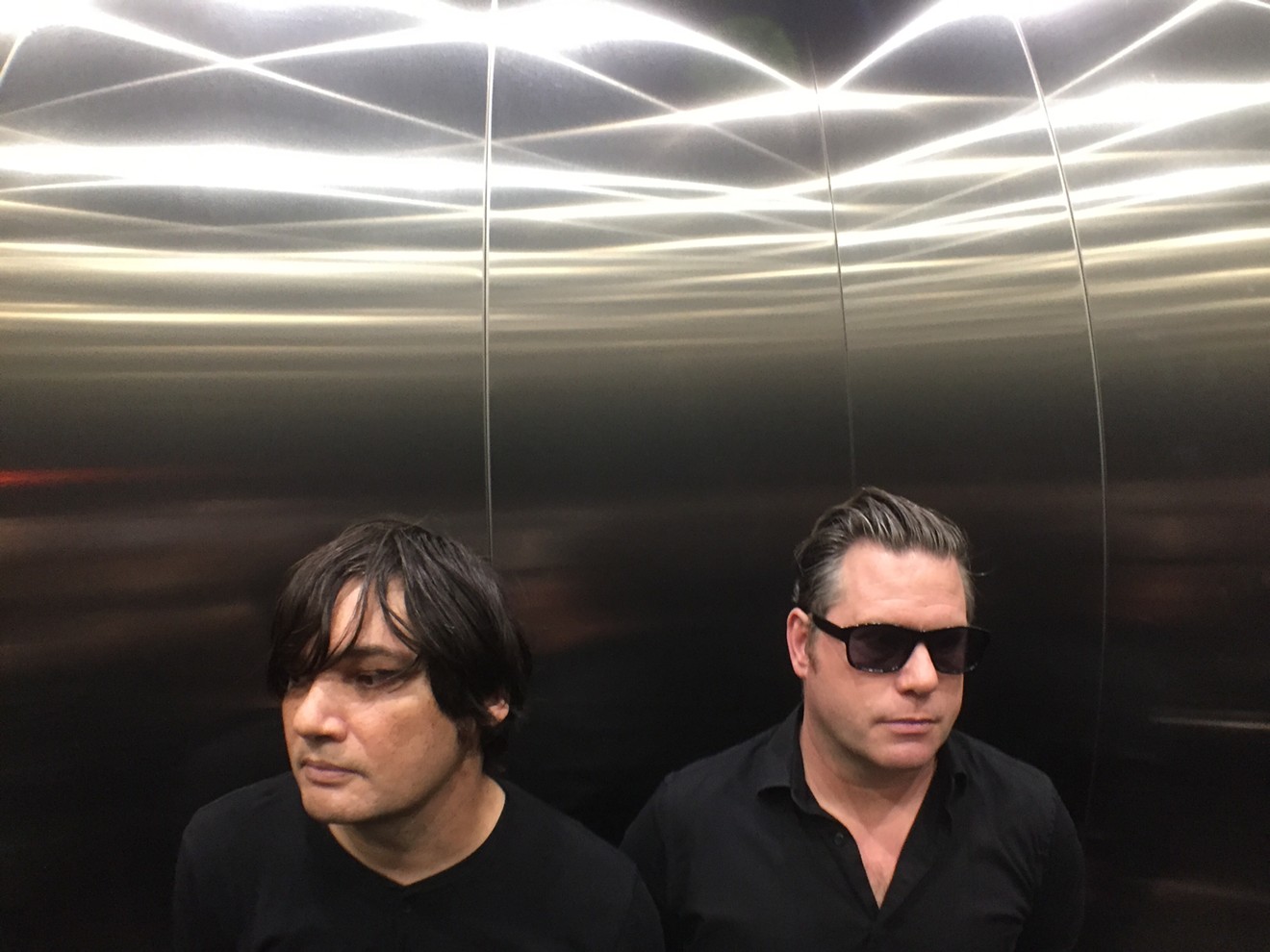When Austin band ...And You Will Know Us by the Trail of Dead began experimenting with the quadraphonic format to mix its eleventh album, XI: Bleed Here Now, members Conrad Keely and Jason Reece realized they had been missing out on the surround-sound experience.
“[The quadraphonic format has] been around, but for whatever reason, musicians have not really embraced it,” explains lead vocalist Keely. “I think they just weren’t aware of its accessibility. Quadraphonic is simply just getting a mix for four speakers.”
XI: Bleed Here Now is currently available on all major streaming platforms. The 22-track record includes guest appearances by Britt Daniel of Spoon and Amanda Palmer of Dresden Dolls. Trail of Dead plays the hi-dive on August 16.
Quadraphonic sound, which implements four audio channels, was introduced in the early ’70s, and thousands of recordings were made using the format. Because it requires four speakers, it wasn’t compatible with a lot of home stereos at the time and was initially a commercial failure. But it saw a revitalization in the ’90s, when surround-sound home entertainment systems became increasingly popular. Keely sees the quadrophonic format as a viable way to mix records, considering that headphones such as Air Bud Pros have become more sophisticated with spatial audio capability.
“It will increasingly become more predominant in the industry with Apple Music streams and now Atmos mixes, which is the best way to listen to the record if you have a surround-sound setup,” Keely says. “With the industry getting more into VR and the metaverse and all that, it will become more common to have surround-sound mixes.”
Keely says that as he started to explore the format, he listened to the quadraphonic mixes of numerous older records, including Black Sabbath’s Paranoid, Pink Floyd’s Dark Side of the Moon and David Bowie’s The Rise and Fall of Ziggy Stardust and the Spiders From Mars. He realized that music fans are often missing out on some great-sounding records by limiting themselves to stereo or mono mixes.
“We kind of live in a surround-sound world,” he says. “When we try to simplify a mix down to the stereo field, it’s kind of like turning everything into a photograph rather than the three-dimensional reality we actually live in.”
He’d like to hear what other artists — dream-pop duo Beach House comes to mind — can do with the format, but also what remixes of classic albums such as Radiohead’s OK Computer or Public Enemy’s Fear of a Black Planet might sound like. Experimental rock band Yeasayer’s first album, All Hour Cymbals, would probably sound awesome mixed in quadraphonic, he adds.
“To hear them mixed for surround sound would be a music appreciator's dream come true,” Keely says. “Suddenly, you can isolate different things when you hear the mixes. ... Most people know Ziggy Stardust, but the quad mix of that is fucking amazing.”
Trail of Dead has always experimented in the studio, so messing around with quadraphonic sound was a natural progression. He got the idea from friend and record producer KamranV, formerly of Interscope Records. KamranV has recorded a quadraphonic record with synth pioneer Suzanne Ciani, and Keely was already a fan of Ciani’s Buchla Concerts 1975 album, so he was intrigued at the thought.
“I realized that if we mix in quadraphonic, it would really allow us to spread out these instruments,” he says. “If you hear our album on true quadraphonic, separated quadraphonic, you’ll hear that. There’s one drum set in the front and one in the back.”
Although the quadraphonic format is primarily based on how the album is mixed after recording, Trail of Dead also did things in the studio to make the mixing easier.
“When we were recording the string section, rather than just having stereo microphones on the string section, we made a point of putting four mics on there,” Keely says. “We knew that was what we were going to end up doing.”
XI: Bleed Here Now also has plenty of theatrical instrumental compositions between the songs. But in spite of the somewhat novel mixing approach and its expansive length, it isn’t a concept record.
The songs' lyrics aren't bound by theme, either. “Taken by the Hand” was written when Keely was eighteen, in 1990, and might actually be the oldest Trail of Dead song to be recorded. Meanwhile, “Protest Streets” was inspired by the Black Lives Matter protests in Austin in 2020.
“There was a very anti-war or anti-conflict feel for ‘Kill Everyone,’” Keely says. “The thought of the impending environmental crisis and the sense of the divide in America [inspired] ‘Growing Divide.’ A song like ‘Water Tower’ was really a song about a certain point in my life, when I was growing up in Olympia."
He adds that every Trail of Dead album is a product of its time, but says he doesn’t consider himself a nostalgic person searching for some golden yesteryear.
“I’m more of a futurist,” he says. “I believe the best is yet to come. We have to strive to make a better future rather than being enamored with the past.”
...And You Will Know Us by the Trail of Dead, 9 p.m. Tuesday, August 16, hi-dive, 7 South Broadway. Tickets are $25. For more information, visit trailofdead.com.
[
{
"name": "Air - MediumRectangle - Inline Content - Mobile Display Size",
"component": "12017618",
"insertPoint": "2",
"requiredCountToDisplay": "2"
},{
"name": "Editor Picks",
"component": "17242653",
"insertPoint": "4",
"requiredCountToDisplay": "1"
},{
"name": "Inline Links",
"component": "18838239",
"insertPoint": "8th",
"startingPoint": 8,
"requiredCountToDisplay": "7",
"maxInsertions": 25
},{
"name": "Air - MediumRectangle - Combo - Inline Content",
"component": "17261320",
"insertPoint": "8th",
"startingPoint": 8,
"requiredCountToDisplay": "7",
"maxInsertions": 25
},{
"name": "Inline Links",
"component": "18838239",
"insertPoint": "8th",
"startingPoint": 12,
"requiredCountToDisplay": "11",
"maxInsertions": 25
},{
"name": "Air - Leaderboard Tower - Combo - Inline Content",
"component": "17261321",
"insertPoint": "8th",
"startingPoint": 12,
"requiredCountToDisplay": "11",
"maxInsertions": 25
}
]











